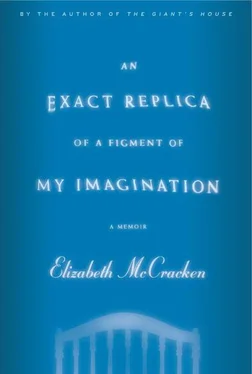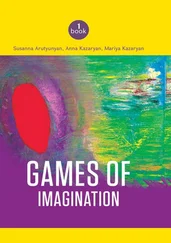Edward and I made a lot of plans that week; we thought all sorts of things were possible. For instance, we decided as we wept that we would go somewhere we’d never been as soon as we could. We were leaving France anyhow: we’d been there for a year and a half, and I’d landed a teaching job in the United States in the fall. Edward would look after the baby while I was at school. Our plan had been to go straight to the States, to Saratoga Springs, to settle in before my job started in September. Instead, we decided to pack the house and just — go. Barcelona, maybe. We pictured ourselves walking beneath a hot, unfamiliar sun, somewhere where the drinks were plentiful and not made in France. We believed that a short while devoted to oblivion and beauty would make us feel better. We thought that we could feel better. Soon enough the notion seemed ludicrous, and we forgot about our Spanish plans. Instead we spent the summer in England, on the North Norfolk coast, looking at the North Sea and hoping that Edward’s U.S. immigration application would be straightened out by fall.
Maybe Spain was just like my early jokes: I wanted to say something to my friends and family that wasn’t Our child died and our life is over .
Anyhow, for a few days we were stuck in Bordeaux, killing time until my follow-up appointment. I didn’t want to eat, we couldn’t drink forever, the hotel room was claustrophobic. Our second morning, we decided to walk through a flea market in a nearby park just to look at something different. All spring we’d gone to French flea markets, driving hours to look at piles of junk, or preposterously priced Louis XVI armoires, or glorious 1930s French bookends. Over the months we’d bought a handsome old clock and a sign advertising oysters, a pair of vases made of WWII artillery shells and a lampshade hand-painted with sea serpents of the here-be-dragons variety. We’d even been to this very flea market the week before, after an appointment with an anesthesiologist.
(He wanted to look at my back to see if I was a good candidate for an epidural, should I need one; he’d said in English, while thumbing my spine, “You see, I may come across your back in the middle of the night. You say you aren’t going to show up in the middle of the night, but somehow you always do. Three, four in the morning, there you are. Always I see you in the middle of the night.”
“I’ll try my best to avoid it,” I said. I planned on avoiding an epidural altogether.
He said, gravely, “Even so.”)
At the Bordeaux flea market a week later we started down the aisles between vendor tents. Every step I took made me sick. All those flea markets we’d gone to were just a form of daydreaming: we were buying objects for some future house we’d live in with the nice baby we were going to have. The glass light-up globe would go on his bookshelf. The low chair upholstered in old carpet would be perfect for nursing. In the spring we would flea-market as a family, the baby in his sling cuddled up while I leaned over one of those flat cases filled with metal whatnots, jewelry, cutlery, old coins, one hand on his head to protect him, the other pointing, as I said, “Excusez-moi, madame. .”
You see, I’d thought he was a sure thing.
Now we passed uncomfortable-looking striped sofas, beat-up leather club chairs, birdcages, chipped teacups, immaculate teacups, the heirless heirlooms of anonymous French people: a kind of fossil record. Vendors with their lunches of wine and bread and oysters balanced plates on their knees. We waded in farther, and I started to gasp.
“We’re going,” said Edward, taking my weight against him, leading me out. “We’re going, we’re going. We’re going, sweetheart, this way.”
If he hadn’t been next to me, I think I would have fallen to the ground and stayed there.
And that, soon enough, was how I felt all of the time.
Where are they when we need them, the Dwarfs of Grief, we sometimes said to each other, when things were really bad.
Which is to say:
I want it, too, the impossible lighter-side book. I will always be a woman whose first child died, and I won’t give up either that grievance or the bad jokes of everyday life. I will hold on to both forever. I want a book that acknowledges that life goes on but that death goes on, too, that a person who is dead is a long, long story. You move on from it, but the death will never disappear from view. Your friends may say, Time heals all wounds . No, it doesn’t, but eventually you’ll feel better. You’ll be yourself again. Your child will still be dead. The frivolous parts of your personality, stubborner than you’d imagined, will grow up through the cracks in your soul. The sad lady at the Florida library meant: the lighter side is not that your child has died — no lighter side to that — but that the child lived and died in this human realm, with its breathtaking sadness and dumb punch lines and hungry seagulls. That was the good news. She wasn’t going to pretend that he hadn’t, no matter how the mention of him made people shift and look away.
A stillborn child is really only ever his death. He didn’t live: that’s how he’s defined. Once he fades from memory, there’s little evidence at all, nothing that could turn up, for instance, at a French flea market, or be handed down through the family. Eventually we are all only our artifacts. I am writing this before our first child turns into the set of footprints the French midwives made for us at the hospital, the stack of condolence cards that tracked us down as we fled France — things that our descendants, whoever they are, however many, might stumble across and wonder about. The urn for his ashes we burned; the ashes we scattered; the hospital bills we paid off. The midwives asked us if we wanted his picture taken. I’d seen nineteenth-century photos, dark with age and fingerprints, children unasleep with eyes closed, maybe a toy wedged in a hand, you could see what was wrong, in the neck, in the mouth: everything. More fossils for the flea market. A dead orphaned child now floating down generations of strangers. Those morbid Victorians, I thought, back when I believed that stillbirth was a Victorian problem. But now I considered the midwives’ offer. This was my child, and surely —
It was Edward who said, decisively, no, because he was afraid we’d make a fetish of it, and he was right. The photo would not have been of our child, just his body. Only from this distance do I understand the difference.
I imagine those descendants, direct or indirect, cousins many times removed, the greatest of nephews and nieces (one of the ways in which I’ve changed forever is that even half joking I will not say grandchildren despite this here snoring baby), someone dear and distant, saying, Their first child was stillborn . But how will they have heard? Will we sit down and tell our second child and maybe, here’s hoping, our third, about their older brother, or will we leave them to find out for themselves?
I don’t want those footprints framed on the wall, but I don’t want to hide them beneath the false bottom of a trunk. I don’t want to wear my heart on my sleeve or put it away in cold storage. I don’t want to fetishize, I don’t want to repress, I want his death to be what it is: a fact. Something that people know without me having to explain it. I don’t feel the need to tell my story to everyone, but when people ask, Is this your first child? I can’t bear any of the possible answers.
I’m not ready for my first child to fade into history.
This is the happiest story in the world with the saddest ending.
That’s the sentence that kept threading through my brain in Bordeaux. I wrote it down in a notebook; otherwise I would have forgotten.
Читать дальше












